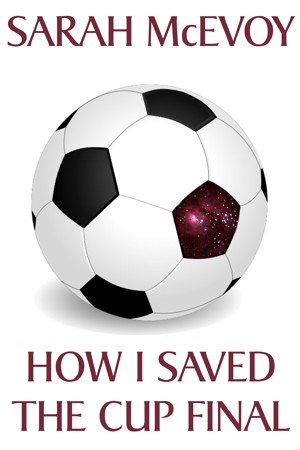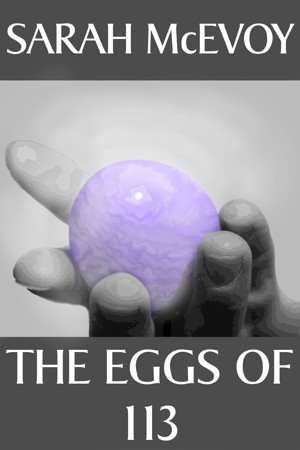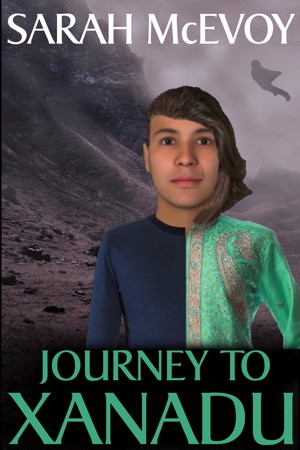Interview with Sarah McEvoy
Published 2015-01-24.
What is your writing process?
I always start with the characters. I prefer the characters to drive the plot, not the other way round. Therefore, I usually establish at least one major character firmly in my head before I start writing, set up an initial situation, and run through a few plausible ways they could take it. Once I have that skeleton in place, I can begin to write. If I try to work out all the details of the plot too heavily in advance, I find it kills it; that approach works for many people, but not for me. I don't often know exactly how a story is going to finish when I start it.
I set scenes very visually, usually from a viewpoint in the middle of the scene; this may or may not belong to one of the characters.
Do you remember the first story you ever read, and the impact it had on you?
I'm not sure, but I think it was probably "Peter Rabbit"; if not, it was certainly one of the Beatrix Potter books. I knew several of those by heart, and used them to teach myself to read at the age of three. "Peter Rabbit" was a good story in itself, but I think the greatest impact it had on me was the little subtext that Long Words Are Not Scary. Beatrix Potter did not hesitate to use the word "soporific" in it, with a suitable explanation for her young readers; and she put it there because it was the most appropriate word in the context. That was a useful lesson in writing right there at the age of three, before I ever wrote anything for myself.
How do you approach cover design?
In a spirit of deep gratitude for image processing software, which enables me to substitute a combination of high technology and glacial patience for the shortfall in my natural artistic talents.
What are your five favourite books, and why?
Oh my. That is a really difficult question, because I have so many favourites. I can pick five at the moment, perhaps, but several of them may not be the same tomorrow. Still, here goes:
1. The Lord of the Rings (J R R Tolkien). While I don't love everything about it, this remains an enduring favourite because of some deeply relatable characters and utterly wonderful descriptive writing. Some reviewer said about it that in places it rises to the greatness of true myth. I'd go along with that.
2. Le Ton Beau de Marot (Douglas Hofstadter). Technically, this book is about cognitive science; but it's also about the joys of poetry translation, with fascinating diversions in all directions, and besides that it is a moving tribute to the author's late wife, Carol. This is the book that inspired me to learn Italian just so that I could play around translating Dante and Petrarch. A fascinating, warm, human, highly intellectual read.
3. 21st Century Science Fiction (anthology: ed P Nielsen Hayden). This very boldly titled book contains a deliciously diverse selection of stories from a wide and talented range of authors. There is something in it for every mood, and almost every single story makes me want to read more by the same author.
4. Pride and Prejudice (Jane Austen). I don't normally like to read romance, but Jane Austen is different. She doesn't serve up her romance with either syrup or an excess of spice; instead, she has her own unique recipe in which the sharpness and piquancy of her social commentary set off and perfectly counterbalance the sweetness of the romantic element. I find her highly intelligent and, in places, extremely funny.
5. Hogfather (Terry Pratchett). I honestly can't pick a favourite Discworld novel, but this has to be on the short list. Death has to stand in for the Hogfather, who is the Discworld version of Father Christmas. What could possibly go wrong? I love Pratchett's combination of riotous humour, deep and genuine human interest, and wide-ranging erudition.
What do you read for pleasure?
Oh, anything, other than horror and erotica. Always books, though. I very rarely read magazines or newspapers.
What is your e-reading device of choice?
I'm not using one at the moment. I had a Sony e-reader, but it broke down, and Sony were frankly unhelpful about repairing it; so, right now, I'm mostly sticking to the dead-tree format. I must admit I do prefer an e-reader, when it works, because they're so light. It's lovely to be able to keep several volumes in my jacket pocket, and to read without getting sore wrists (my wrists don't quite work like other people's, and I have to wear splints to support them). But it's no earthly use if it breaks down, is it?
What book marketing techniques have been most effective for you?
Heh. Ask me that one when one of them has.
Describe your desk
It's pretty cluttered. Mostly, I regret to say, with medications. I'm getting old.
Where did you grow up, and how did this influence your writing?
I grew up in Kendal, which is on the edge of the English Lake District. I don't know that this did influence my writing very much at first, but it's doing so more as I get older; I'm doing rather less science fiction now, so I'm not so much off on other planets, and when I'm writing stories set on Earth I'm more inclined to set them in or near Kendal.
When did you first start writing?
When I was... oh, four? Five? I can remember the first line of the first story I ever wrote. It was: "Mrs Youdell, you must know, is a duck."
I have not the foggiest idea what Mrs Youdell went on to do, but even now I think that's not too bad a name for a duck.
What's the story behind your latest book?
It grew out of my Girl Genius fan fiction. I relate very heavily to the character of Ardsley Wooster, largely because the poor man is so stressed (and who wouldn't be, in his job?), and so I've written over fifty stories in which he is a major character, all fitting into a coherent fanon. Eventually, I took elements from this to create my own original steampunk spy character, Dr Charles Grosvenor, who is the hero of the book I'm working on at the moment, "The Shield of Venice". Dr Grosvenor... might... just... look a little bit like Mr Wooster. However, as all good characters inspired by someone else do, he's developed into very much his own person.
Smashwords Interviews are created by the profiled author or publisher.
Books by This Author
How I Saved the Cup Final
by Sarah McEvoy
How do you handle a Cup Final when the two teams come from planets with different conditions? Taw Braley, a socially challenged robotics expert, finds out the hard way in this short piece of SF comedy when his football-crazy girlfriend drags him along because a team from Earth is involved.
The Eggs of 113
by Sarah McEvoy
A short story celebrating the power of the human imagination in a dystopian future setting. Uldar, a political prisoner, receives a visit from a psychologist, which does not go at all according to the official plan.
Journey to Xanadu
by Sarah McEvoy
(4.50 from 2 reviews)
A science fiction thriller set mainly on Titan. The Martian ambassador to Titan is suspected of involvement with a shadowy organisation called the Grey Ring, and Akira Sengupta is sent to investigate.



